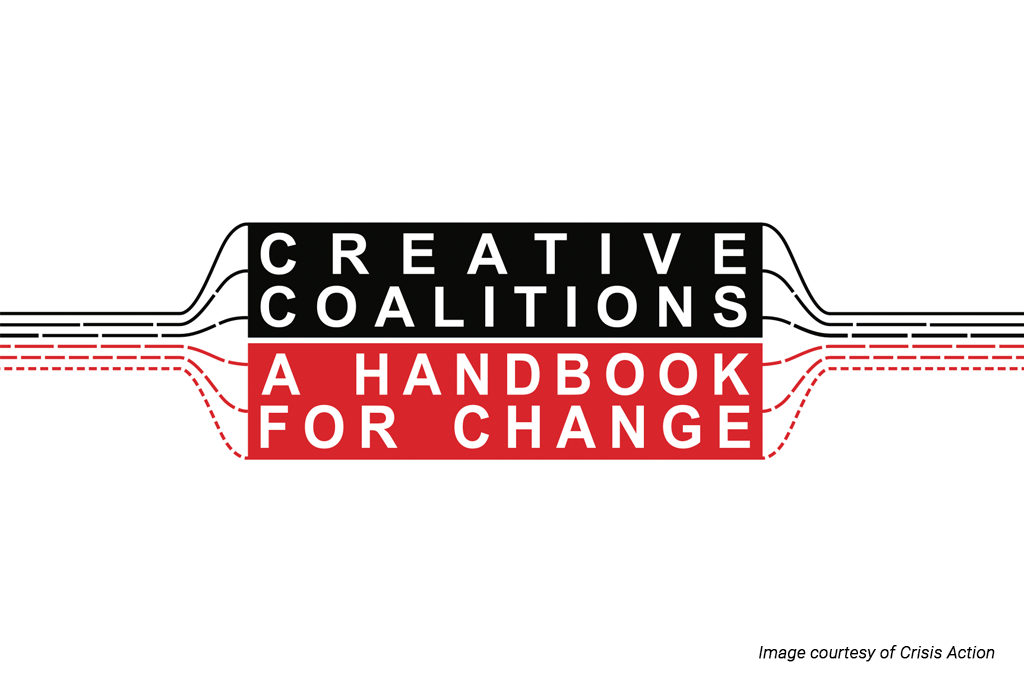The 5th Publish What You Pay (PWYP) Global Assembly took place as an online event from Monday, 27 to Thursday, 30 June 2022.
This event was special: it marked the 20th anniversary of the PWYP campaign, launched in June 2002. It was a key moment to celebrate PWYP members and their achievements, and to reflect on what it means for each of us to be part of this diverse, inspiring network. With the help of 55 outstanding speakers, the Global Assembly explored some of the main issues facing the extractive sector today, including gender equality, contract disclosure and a just energy transition.
In total, 407 people from 71 countries participated in the event, of which 15% were under 30 and half were women, compared to 40% at the Global Assembly in 2019. This makes it the biggest and most inclusive PWYP Global Assembly so far. The increase in participation of women over time shows that our members’ continuing efforts to make our movement more inclusive are having an impact!
A large majority of participants were from civil society, with donors, governments, industry and the media also in attendance. Participants spent more than five hours on average on the platform; and 142 1:1 connections were made in the speed-networking sessions, allowing the creation of new relationships between members in different countries. And finally, 19 expo booths were set up by coalitions and members to showcase their work. 91% of the respondents to our feedback survey rated the relevance of the side events, good or very good. In addition, the gender and regional balance of the speakers was rated good or very good by 86% and 82% of the survey respondents respectively

Below is a summary report of key outcomes of the main sessions*.
Opening & keynote session – 27 June
Olena Pavlenko, President of DiXi Group and Outgoing Chair of PWYP’s Global Council, opened the session by highlighting the great work that has been carried out by PWYP for the last 20 years on corruption, transparency and accountability and EITI implementation. She recalled the creation of new coalitions since 2019 in India, Lebanon, Kosovo, South Sudan, and Colombia, the latter being the first coalition in Latin America and the Caribbean, a region where there is strong demand for PWYP to strengthen its presence. She also noted that over the coming decades, PWYP members will increasingly have to address issues of climate change, decarbonisation, digitalisation, cyber wars, and the shrinking of civic space. The movement has to answer the concerns of the younger generation, expressed in a short film screened during the event, in which seven young PWYP members from all over the world expressed their demands and hopes for the future.
The keynote speaker, Mirtha Vasquez, former Prime Minister of Peru, lawyer and environmental advocate also focused her remarks on climate change and the negative effects of mineral extraction in Latin America and the Caribbean, giving the example of farming communities impacted by mining in Peru. She stressed that the energy transition needs to be considered very carefully as many communities are still heavily dependent on fossil fuels. If carried out inappropriately, the energy transition may generate greater inequalities.
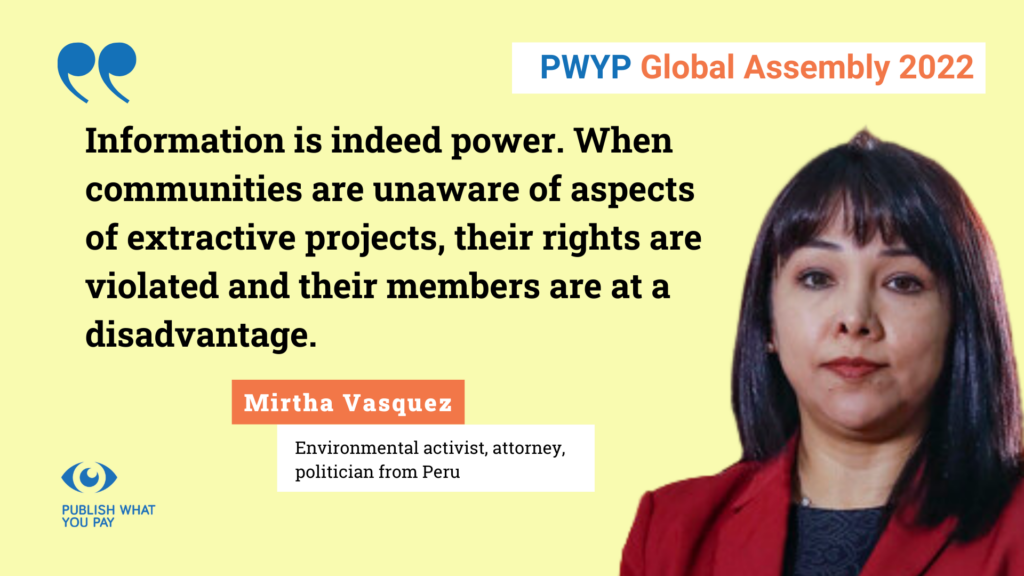
Three pioneers of the PWYP movement, Cielo Magno, Olena Pavlenko and Emmanuel Kuyole, reflected on what PWYP should do differently going forward. They notably raised the question of the phasing-out of fossil fuels. This echoed the call for a just energy transition, made by ten PWYP pioneers in a second film screened during the event. They also pledged to make the movement more effective by drawing on the strength of various groups, including young people.
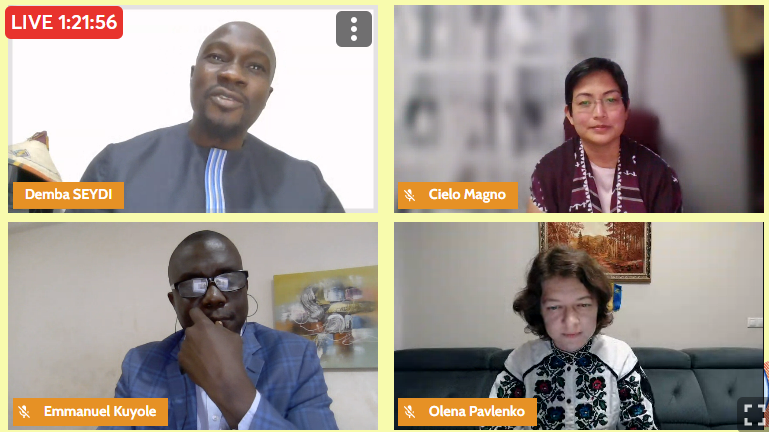
Securing a just energy transition for resource-dependent countries – 28 June
This session explored the landscape and risks of the forthcoming energy transition and what that means for resource-dependent countries. The speakers highlighted that the fossil fuel phase-out was not happening fast enough to effectively tackle the climate crisis despite commitments made by investors, countries and governments. A key concern raised was the risk that an unfair phase-out could widen already existing global inequalities. Special attention must be given to countries whose economies rely heavily on oil and gas extraction, as well as to countries that are rich in strategic minerals (like cobalt, copper, zinc and manganese) increasingly needed for renewable energy technologies The viability of the economic model still pursued by many countries – of extracting oil and gas to generate revenues for development – was challenged. It was noted that only 33% of the profits from oil and gas in Africa remain within the continent, for example, out of which a huge percentage goes towards meeting obligations countries have with extracting companies. A key recommendation from the session was the need to advocate to the international community to put in place guidelines that will help safeguard communities from exploitation during the anticipated boom in demand for critical minerals.
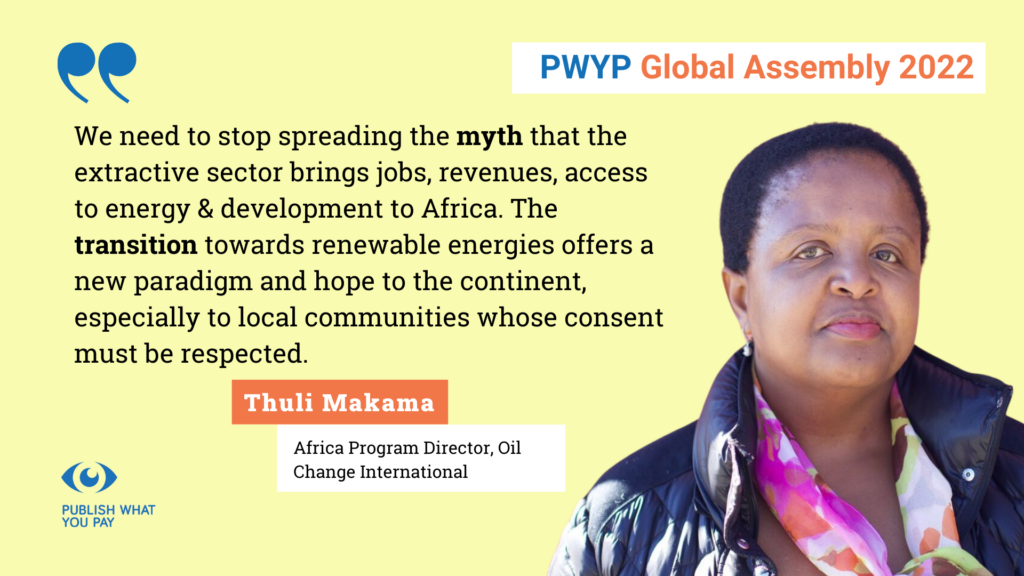
Thinking Beyond The Norms To Foster Feminist Natural Resource Governance – 29 June
This session outlined several approaches that have been employed to include women in the natural resource governance sector. The Zambia Alliance for Women works to enhance the voices of women in the sector by empowering them to hold duty bearers (government and mining companies) to account for the monies received from the mines; and to explore how it can be used to directly benefit their communities. In Ghana, the African Centre for Energy Policy focuses on ensuring an inclusive and positive energy transition towards more innovative and clean energy sources, by involving women at every stage. It educates women in the communities about clean and safe energy and on the advantages of abandoning their traditional forms of cooking, using charcoal, and towards more innovative and clean energy fuels such as ethanol. In Indonesia, civil society is collaborating with EITI Indonesia Secretariat to mainstream gender in the country’s development plans as well as in the country’s budgets across the energy sector. PWYP Kyrgyzstan is working towards ensuring that data in the country is gender-disaggregated. The coalition does this by i) documenting the participation of women in the workforce and mining sectors, ii) empowering coalition members, activists and journalists, to advocate for gender-related issues in the mining sector and iii) supporting the EITI multi-stakeholder group members as well as the national PWYP coalition members to promote women’s participation in the natural resource governance sector.
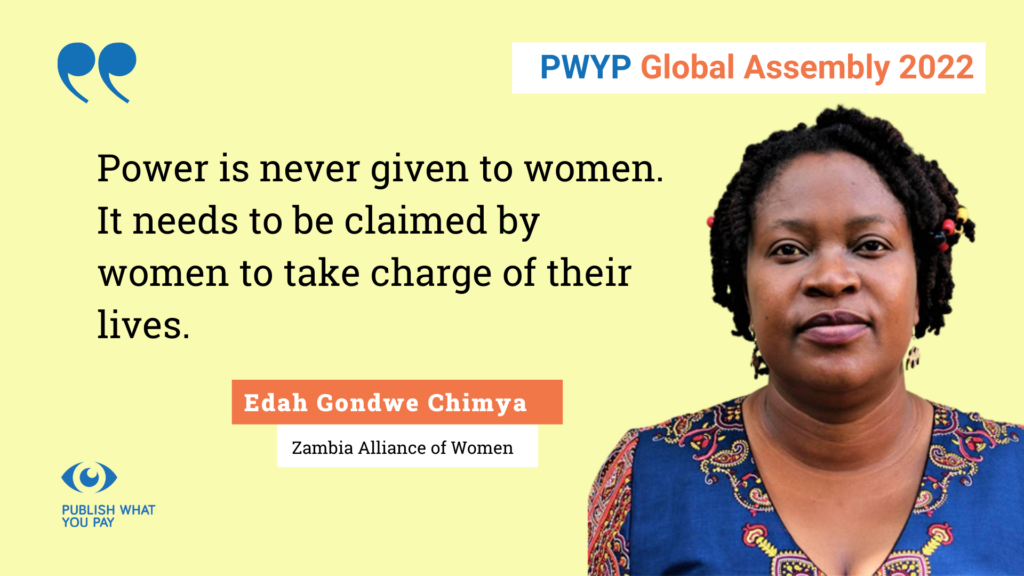
Contract Transparency: Lesson Learned And Future Prospects – 29 June
This session focused on experience sharing from different stakeholders including representatives from civil society (both global and national), government and the private sector. Discussions centred on strategies for how to collectively #DiscloseTheDeal; and progress and challenges on extractive contract transparency at national level, including progress made on the implementation of the EITI Standard on contract disclosure. The achievements of the Lebanese and Malian coalitions were presented as inspiring examples of successful campaigns for contract transparency. Key recommendations were given on the future of contract transparency:
- Apart from the main contracts, civil society actors should push for additional documents such as social-environmental documents, financing agreements, and infrastructure agreements, to be added to the list of documents to be disclosed.
- To get those documents published, civil society activists and governments should reach out to people they normally do not engage with, such as local governments.
- Civil society actors should work towards ensuring that people understand the contents of these documents and how to effectively use them.
- Investors should prioritise contract transparency and use shareholding to influence a company performance (shareholder activism).
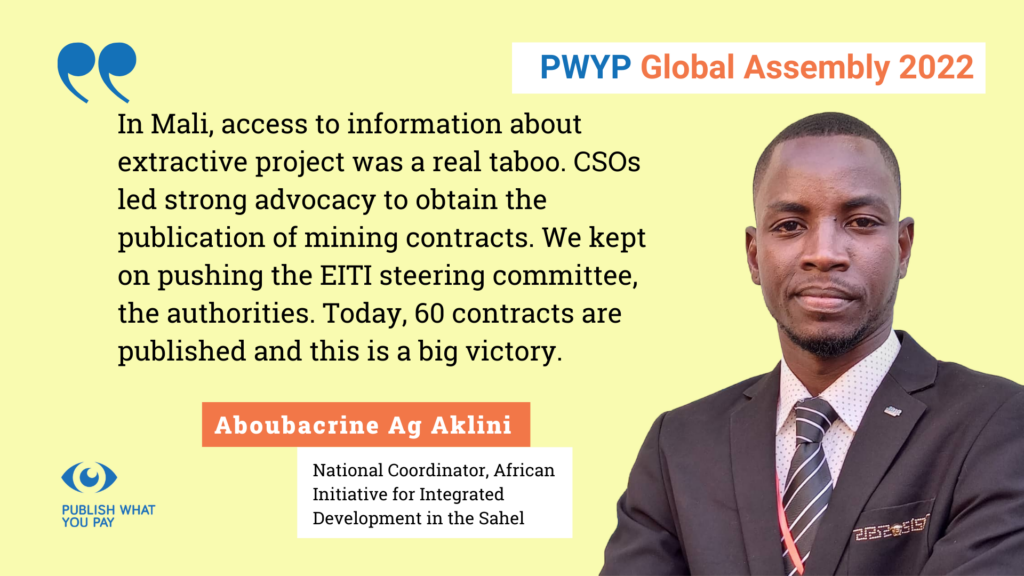
Leadership and Governance: Working Together As A Global Movement
The Chair of the outgoing PWYP Global Council, Olena Pavlenko, shared a report, on behalf of the PWYP Global Council, that brought out key updates since the last Global Assembly Meeting in 2019. The outgoing PWYP Executive Director of the International Secretariat, Elisa Peter, presented a report from the International secretariat to the PWYP Global Assembly that focused on the following key messages: Resilience, Impact, Resources, People and the Future. This reflection was for the past three years and for PWYP going forward. Among other developments, she highlighted that additional positions had been created in the PWYP Secretariat to effectively keep track of its impact, manage the increased operational responsibilities, carry out global campaigns as well as raise and effectively manage funding received, including through sub-grants to PWYP coalitions.
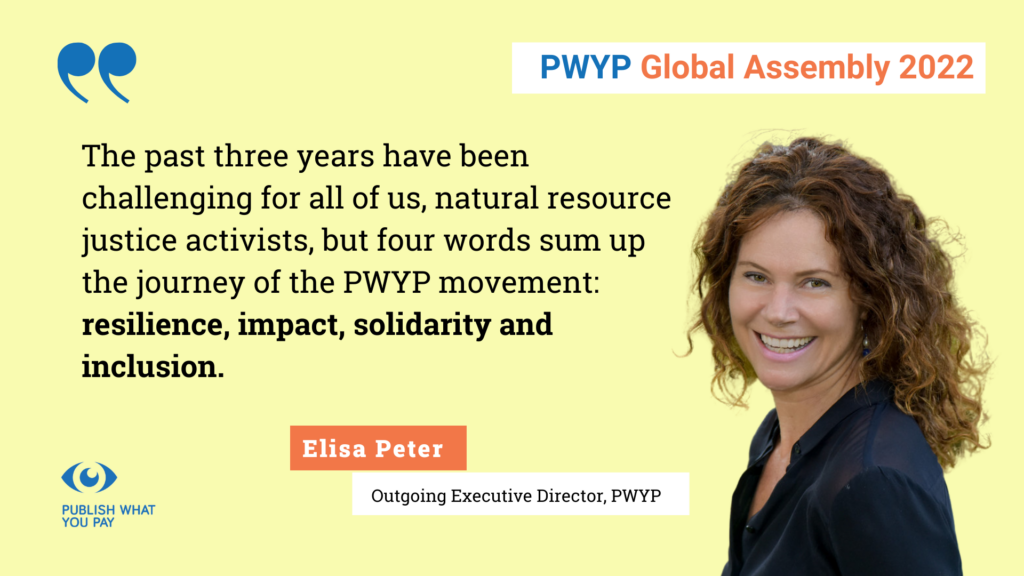
PWYP Governance Manual: Gloria Majiga, a member of the outgoing Global Council, presented the proposed updates to the PWYP Governance Manual. The Global Assembly unanimously adopted the proposed changes to the manual.
PWYP Gender Policy: Stephanie Rochford, Director of Member Engagement at the PWYP Secretariat presented PWYP’s first ever Global Gender Policy for adoption, noting that this new policy is critical for PWYP as it will help to guide the implementation of our commitment to gender equality and inclusion. The Global Assembly unanimously adopted the PWYP Gender Policy.
Introduction of Global Council members: the new Global Council members, elected by PWYP members between March and May, introduced themselves to the Global Assembly: Aida Gamboa (LAC), Carly Oboth (Europe & North-America), Fuad Hasanov (Eurasia), Georges Mpaga (Francophone Africa), Monday Osasah (Anglophone Africa), Noralhuda Hasan (Middle-East and North Africa), Saswati Swetlena (Asia-Pacific), as well as Maria Ramos (Oxfam America) and Evelyne Tsagué (NRGI), the two representatives of organisations with Global Reach. Fatima Diallo, representative of the Africa Steering Committee on the Global Council was also present.
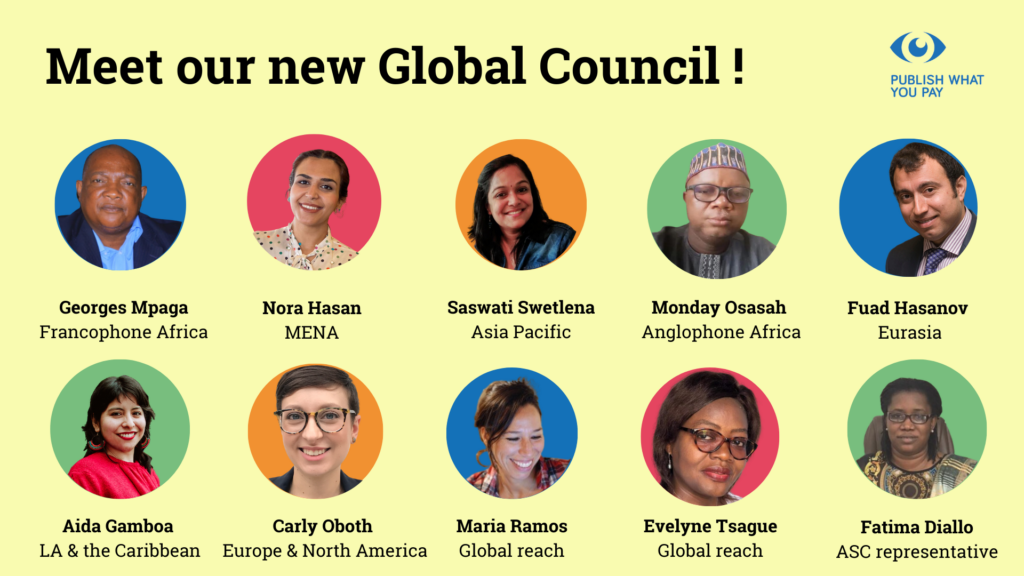
Closing Remarks: Elisa Peter reflected that her six years at the PWYP Secretariat were “the most rewarding experience in [her] entire life.” She stated that she was humbled by the courage, passion and dedication of PWYP members to make the world a better place. She congratulated the new Global Council members on their appointments and wished them success.
To watch or re-watch the sessions, please click on this link.
*A comprehensive report is available.










